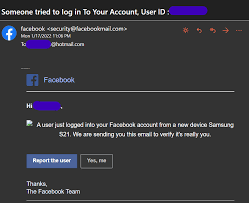Is the Email From “Security@facebookmail.com” Legitimate?

The internet has become an integral part of our lives, and with this comes the need to consider the security of the information we share online. Social media platforms such as Facebook have become widespread, making it easier for people to connect with others near and far. However, there have been numerous reports of privacy breaches on social media platforms, which is why many individuals are cautious about the legitimacy of emails sent to them. One such email that has raised concerns is the email from “security@facebookmail.com.”
The email from “security@facebookmail.com” is a message that you may receive from Facebook’s security team. It is designed to alert you about potential security risks and update you about Facebook’s security measures, such as two-factor authentication. However, the email has been the subject of much scrutiny, with many people questioning its authenticity. Some have concluded that the emails are merely phishing scams designed to steal Facebook login credentials.
To determine whether the email from “security@facebookmail.com” is legitimate, you should evaluate its content and purpose. A legitimate email from Facebook’s security team would typically be concise and contain information that pertains to your account. It may, for instance, provide you with your account activity, alert you about a suspicious login, or suggest that you change your password. Most importantly, the email should come from an official Facebook email, and the sender’s address should be consistent with Facebook’s email format.
If you receive an email from “security@facebookmail.com,” here are some tips to help you identify whether it is genuine:
1. Check the sender’s email address: As mentioned above, a legitimate email from Facebook’s security team will come from an official Facebook email address. Look for the address “security@facebook.com.”
2. Look for red flags: If the email contains spelling and grammatical errors or uses generic language, there is a high chance that it is not genuine. Legitimate emails from Facebook’s security team use formal language and address recipients by their first name.
3. Check the links: Phishing scams often contain links that appear genuine but lead to fake login pages. Hover over the link before clicking it, and check if it contains Facebook’s domain name.
4. Contact Facebook support: If you are unsure about the authenticity of an email, contact Facebook’s support team using the contact means provided on their official website.





